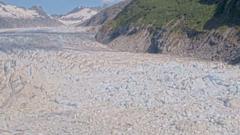While Putin seeks recognition and territorial gains in Ukraine, Trump aims to position himself as a peacemaker, complicating the potential for meaningful dialogue at the summit.**
Diverging Goals: What Trump and Putin Aim to Achieve in Anchorage Summit**

Diverging Goals: What Trump and Putin Aim to Achieve in Anchorage Summit**
As US President Donald Trump and Russian President Vladimir Putin prepare for their high-stakes meeting in Alaska, their contrasting objectives outline a complex geopolitical landscape.**
US President Donald Trump and Russian President Vladimir Putin are set for a significant summit in Anchorage, Alaska on Friday, both coming with distinct objectives, particularly surrounding the ongoing conflict in Ukraine. Trump, on one hand, is eager to portray himself as a global peacemaker, while Putin is firmly focused on securing recognition for Russian territorial claims.
Putin is likely to leverage the Anchorage summit to gain international legitimacy. The meeting symbolizes a failure of Western isolationist policies, and for Putin, it’s an opportunity to assert that Russia remains a key player in global politics. The choice of Alaska as the meeting venue serves multiple purposes for Putin; it provides a strategic distance from Ukraine, allows secure access, and underscores historical tensions over territorial disputes.
Moscow’s narrative, as noted by Russian media, emphasizes that shifts in national borders can occur, which echoes through their claims on Ukrainian territories. Putin insists on retaining control over four regions in Ukraine—Donetsk, Luhansk, Zaporizhzhia, and Kherson—regardless of Ukrainian opposition. The Kremlin hopes that by gaining tacit approval from Trump for these territorial ambitions, they might sideline Ukraine and further their geopolitical goals.
On the flip side, Trump has been vocal about his desire to end the Ukraine war quickly, claiming to possess the ability to broker peace in just days—an assertion that hangs in the air as he approaches the summit with mixed intentions. His unpredictable stance has often left both allies and adversaries unsure of his true long-term strategy. Recent statements suggest a focus on maintaining dialogue rather than concrete agreements, with Trump alluding to the summit as a “feel-out” meeting.
Despite his previous criticisms of Putin’s actions and the unfolding humanitarian crisis in Ukraine, leveraging this meeting to claim progress toward peace would bolster Trump’s reputation on the international stage. He has spoken of the possibility of a land swap, which raises concerns in Kyiv that it could lead to unwanted concessions.
As Trump seeks the allure of a potential peace deal—perhaps to enhance his political legacy, ideally with an eye towards a Nobel Peace Prize—Putin, a seasoned strategist, is likely to navigate the talks to ensure any perception of success aligns with Moscow's interests.
European leaders and Ukraine's President Volodymyr Zelensky are closely monitoring the summit, advocating for a cautious approach and hoping to avoid any agreements that undermine Ukraine’s sovereignty.
The Anchorage summit stands as a pivotal moment where both leaders aim to advance their narratives, amidst a complex backdrop of aspirations and geopolitical tensions.




















